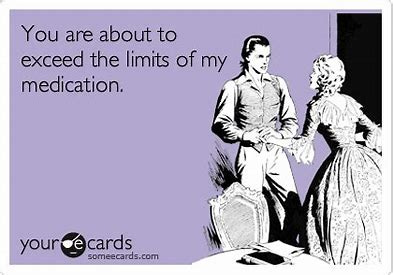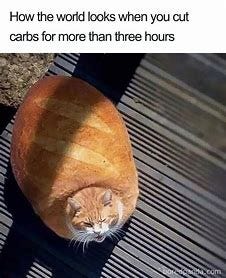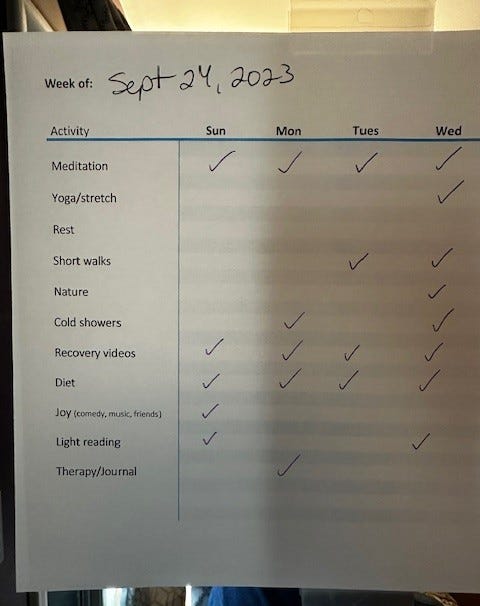This mid-week post was a writing exercise as part of a fun and informative class I’m taking called The Substack Soiree.
I remember that in my first year of Long COVID, every month brought a new exclamation of shock and disbelief: “I’ve been sick for FOUR full months” or “I’ve been sick for EIGHT months, am I ever going to recover?” This all seems kind of laughable now as I round the corner on 3.5 years. I felt so helpless and hopeless back then; today, despite the fact that I can now measure this illness in years instead of months, I feel much less afraid and much more optimistic about recovery.
I think that’s because I have borne witness to so many recovery stories and I am homing in on the threads that pull through many of them. I have also very slowly but surely been feeling a bit less fatigued, less short of breath, and I go entire days now without the burning/buzzing/cold skin sensations of peripheral neuropathy.
While I am focused on what’s ahead, I thought I might share the things I’ve tried over the past 3.5 years that haven’t worked at all for me. The caveat to making a list like this is that the illness experience of - and it turns out, the recovery from - Long COVID and ME/CFS is incredibly specific to each individual. So much of what I have tried over these years has worked for others, either in large or small measure, but did not seem to move the needle at all for me.
I have, however, learned a lot from these trials (I can’t really call them errors, because they were as likely to work as they weren’t, and the only way I was going to know was to try). In his essay Failure Liberates Success1, Kevin Kelly, former editor of Wired magazine and author of What Technology Wants, states:
“We can learn nearly as much from an experiment that doesn’t work as from one that does…you should aim for success while being prepared to learn from a series of failures.”
As frustrating as failure is, it is a necessary step on the path to success. So, I’m here for it.
If you’re a long hauler or living with ME/CFS, I’d love to hear from you too on what you tried that didn’t work. (I’m also planning a post on what has worked or at least what has helped). Let’s compare notes, without making ourselves feel bad if something didn’t work for us but worked for others.
The eight things
Low-dose naltrexone
This drug, which is usually used to treat opioid addiction but in very small doses has been used to treat a wide range of autoimmune and chronic illnesses, has often worked wonders in helping long haulers and folx with ME/CFS reduce their fatigue and make them more functional throughout their day. I was one of the unlucky ones who saw absolutely no difference in how I felt no matter what dose I took.
Maraviroc/ivermectin/statin (otherwise known as the IncellDx “Roctail”)
Dr. Bruce Patterson, the former head of pathology at Stanford University, and his colleagues at IncellDx were some of the first to research mechanisms and potential treatments for Long COVID through their Chronic COVID Treatment Center. I was in one of their first patient cohorts back in 2021 and I was on the “Roctail” for several months (fun fact: I coined that phrase amongst the long haulers on Facebook, a play off of the main drug used, an HIV medication called Maraviroc). It helped me tremendously; I got back to about 80% functioning, was able to work full-time with no problems, and could even hike a bit.
That is, until I had an extremely stressful week at work where adrenaline coursed through my veins on back-to-back days, followed by a planned weekend hiking trip to the Berkshires. I CRASHED and hard. After that point, the Roctail stopped working. They switched my medications, and they didn’t work either. And I have been back to square one ever since that week. Which brings us to the next thing on the list that didn’t work…
Fluvoxamine
IncellDx claimed that the Roctail had done its job for me: it put out the forest fire (by eliminating the spike proteins). Fluvoxamine was then, in theory, supposed to rebuild the forest (address the lingering inflammation). It did absolutely nothing. After trying it for close to four months, I tapered off of it and a long hauler friend recommended that I try the functional medicine doctor she had been seeing.
Anti-virals (famciclovir or valacyclovir)
My infectious disease doctor is the first one who noticed that COVID reactivated my latent Epstein Barr virus (I had mononucleosis when I was a teenager, also known as glandular fever). To try to tamp this down, she put me on a daily dose of famciclovir. About a year later, she switched me to valacyclovir. Neither of these has had any effect on my symptoms and my EBV early antigen levels have remained high. About three months ago, she increased my dose of valacyclovir to 1g a day. I think she may be keeping me on this because there is some evidence (here too) that it tamps down B cell production and may stop or slow the development of multiple sclerosis and cancer.
Supplements (including NAC, CoQ10, NMN, glutathione, l-acetyl carnitine, quercetin, and many, many more)
The list of supplements I have tried, especially within the last 1.5 years since I’ve been seeing the functional medicine doctor, is LONG. I have spent boatloads of cash. None of it has made a lick of a difference in my symptoms. Whether it does anything behind the scenes, who can say. My guess is I just pissed most of that money right out.
CBD
I tried gummies, then I got some high-quality oils from an old high school friend who works for a great company called Native Ceuticals. I know CBD has helped a lot of long haulers with pain and sleep in particular. It had zero effect on me. (But if you want to try it, I definitely suggest ordering from them. I can put you in touch with my friend, who can advise you on the right products).
Probiotics
CW: poop talk coming.
Since I got COVID in March 2020, I have had chronic constipation. Nothing I eat has any effect on this. No medicine I’ve taken has any effect. Added fiber (via food and supplements) not only had no effect, but fiber supplementation and prebiotics actually made the problem worse somehow. (I am convinced that COVID permanently altered my gut biome or that there are viral fragments hanging out in small pockets in my intestines, which has been hypothesized in many studies). And so it follows: probiotics, so many different brands and strains (and some super expensive), have had no discernible effect.
Special diets (low histamine, keto, gluten-free/dairy-free)
I am currently on a gluten-free/dairy-free diet. While I don’t think it’s made any significant difference, I do think that eliminating gluten is a good idea from an anti-inflammatory perspective, and it’s easy enough for me to do since I’m not a huge bread lover and GF pasta is totally fine. Eliminating dairy did help a bit with my COVID-induced eczema, but that was probably my least troublesome symptom, so I’m not going to count it as helping to any measurable degree.
I also have mast cell activation syndrome (MCAS) and a low-histamine diet is supposed to help keep food sensitivities at bay. But my MCAS doesn’t manifest in food sensitivities (that I can tell), so this diet made no difference.
I was on the keto diet for about a month last year after reading that this helped some long haulers. I dropped 10 pounds quickly and I was nauseated for the entire month, with no difference to my fatigue or other symptoms, so I stopped it.
That concludes our list. Stay tuned for an upcoming list of the things I believe have been helping me. In the meantime, here’s a sneak preview at the checklist I keep taped to my closet mirror, which helps me remember to prioritize the things that are helping.
**Disclaimer: I am not a licensed medical professional, and you should not rely on any information contained in this newsletter in making medical, health-related or other decisions. Please consult a doctor or other health professional.
I highly recommend the book that this essay is in, This Will Make You Smarter, a compilation of short essays edited by John Brockman that explores scientific concepts to improve the way we think.















Thanks for sharing a snapshot of your checklist of things that help! Now I want to make one for myself as a reminder to prioritize the things that help me.
Just read your Mail from the Date above.
I might be a little bit late but you know with ME/CFS its not easy to be up to date and finish your quests like you wish.
BUT, your mail made me laugh naturally on many places, thanks for that :)